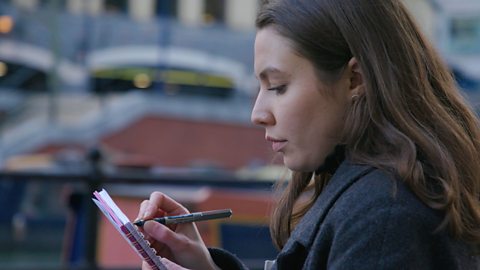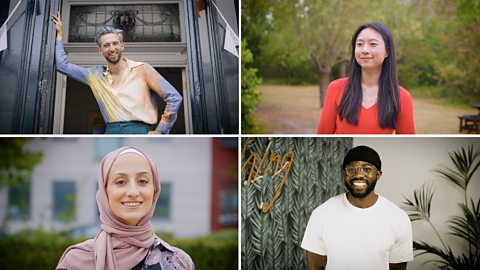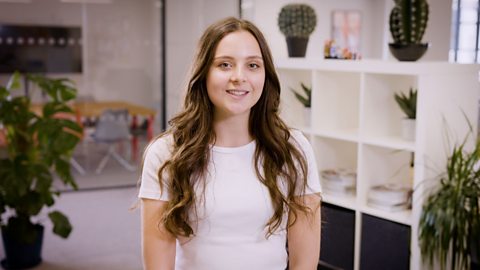Meet Taran, 30, a writer, performer and translator based in Bristol. Find out more about how he uses Cornish in his role. Part of our Bitesize world of work series.
As a specialist in the Cornish language, which isn't widely spoken, his expertise is often in demand and leads to a real variety of work. Taran's work can include performing at poetry events, translating Cornish material into English or even running workshops on the language.
People say that language is so magical!
Taran:
Ow hanow yw Taran. Hwedhlor, bardh-garma, ha treylyor ov vy. -My name is Taran. I'm a spoken word poet, storyteller and translator.
My name is Taran. I'm a spoken word artist, storyteller and translator.
Kuntelas orth bedhow gweder mor. Nyns yw glas mes gwyrdh -Gathered on graves, sea glass. Not sea blue but inorganic green
I am a writer, performer, translator, anything that people may need in terms of the arts, in the Cornish language or indeed in English. My job is not your usual 9-5. It can vary wildly between many, many things. It could look like a day full of emailsand admin. Or today I'm here with one of the organisations that I workwith to bring poetry and music in Bristol. We're doing a workshop in Arnos Vale Cemetery. So, we give writing tasks and prompts and perform everything that we've written to each other.
Contributor 1:
A silken shroud woven by a spider.
Contributor 2:
The sounds remind me of life strangely.
Contributor 3:
The very thing that holds your feet to ground.
Taran:
The Cornish language is undergoing a active revival at the moment. It is still fairly small, the number of fluent speakers are in the few hundred.
Yma yn kerghyn losow glas yn hwir -There are plants surrounding, truly living green
It would be so incredibly sad to lose that heritage, let alone the potential futureand musicality and art and understanding that a language of any kindbrings to modern perception of the world.
Ow kramya oll a-dro an growan ha kyllasen - Crawling all around the granite and slate
Tenna a-woles an mordardh - Pulling beneath the surf
The Cornish language is built very differently to English, and this becomes especially important when you're translating poetry. It’s deciding how you tryand get the meaning of the poem, or whether you try and use a more literal translation, and it's the toss up between the two things.
Kemeras y’n kerensa a vernans - Taken into the love of death
I love my job. Hearing people say, ‘Oh, that language is just so magical.’ People come up and talk about folktales and giants and fairies and mermaids, and I get to be this doorwayto that world. So, I learnt Cornish from a very early age. I consider it my first language. When I was very young, I knew that I wanted to do creative things. I went away to Aberystwyth in Wales and studied drama and performance, and then I went to Bristol and joined the very lively spoken word poetry scene. I threw myself in, started going to open mics, and soonI was getting commissions.
Pes termyn bys pan ty a yllydh leverel “Ev o kemeras gans an mor!” - How long until you can say “he was taken by the sea!”
So, I am a freelancer, I'm self-employed, and what that means is, I don't have guaranteed work. I have to fight really hard to find opportunities and I have to build networkswith other creatives. It's not something that is really taught to you. You’re having to fill out your tax forms, you're having to do invoicing. These are things that I wish I had more of an understanding of before I got started so that I could make surethat everything was organised when it finally came to going outon the road and doing shows. My language skills have really helped as a creative. There is never a time in which knowing another language is a bad thing. Having a language that is in the minority gives a certain worldview that you don't get from knowing other languages.
Rag Ankow a’th guntel orth an dor - For when Death collects at the earth
My advice, if you are going to pursue a career in the arts is be confident about it. Do it. Get started doing something, whatever it is. Things might not go the way you want,but they will lead you to somewhere else that you hadn't expectedand you will find something new there. So, keep at it.
(mor) a vydh tevi dhyworth dha gorf Ha maga dha vreynans - (sea) will grow from your body and nourish your decay
- The main skills Taran uses in his role include the ability to be persistent, use initiative and have strong communication skills
- Growing up in Cornwall, Taran learnt Cornish from a very young age and considers it his first language
- He knew he wanted to do something creative when he was older and so decided to study Drama and Performance at Aberystwyth University
- When Taran moved to Bristol, he got actively involved in spoken word and poetry events, such as open mic nights, where he was able to put his Cornish language skills into practice. Before he knew it, he was getting commissions for his Cornish poetry
- He says that Cornish is built very differently to English so it can be a hard language to learn. He says it can be especially challenging when translating poetry because you sometimes lose some of the nuance or double meaning
- As a freelancer, he doesn't have guaranteed work, so has to build networks with other creatives to find opportunities
- When starting off in the industry, he wished he had known how organised you need to be. There's a lot of admin involved before the writing and performance side of being a creative can begin. However, Taran says it's all the sweeter when you get round to being on the stage, as you know how much work you've put into it!

Top tips
- If you want to pursue a career in the arts, don't be afraid to just start doing something you enjoy, whatever that may be. Things may not always go the way you planned but they can lead to other opportunities
- The key is perseverance. Keep working on your stuff, take rejection as an opportunity to do better, to put your work somewhere else. Keep at it!

Taran is self-employed and works as a freelance writer and translator. This means he works with different companies who need his writing skills. Freelance commitments can vary from a few hours a week, to working with a team on a long-term project. Working for yourself looks different for each person and each business.
What to expect if you want to be a business owner
The salary and working hours when you own a business can vary enormously but what's most important is that you work hard and love what you do.
Working for yourself looks different for each person and each business, but in general it means you:
- run your own business and are responsible for its success
- can decide how, when and where you do your work
- charge an agreed, fixed price for your work
- sell goods or services to make a profit
- can hire people at your own expense to help you or to do the work for you.
You can be both employed and self-employed at the same time. You can work for your employer during the day, for example, and run your own business in the evenings and at weekends. It’s important to contact HMRC for advice if you’re not sure if you’re self-employed.
You can get help with setting up or developing your business, through the government’s business support services, for example, for advice about tax or about how to find funding to start your business.
This information is a guide (source: GOV.UK).
For careers advice in all parts of the UK visit: National Careers Service (England), nidirect (Northern Ireland), My World of Work (Scotland) and Careers Wales (Wales).

How to become a writer. collection
A collection of writer job profiles and information about what the role entails.

How I use modern languages in my career. collection
Find out more about careers that use modern languages.

Kate: a travel consultant. video
Kate is a travel consultant and organises school trips all around Europe.
